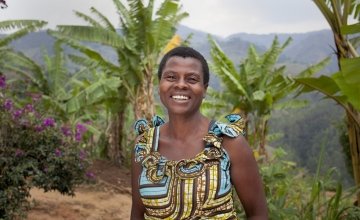
Read our 2023 annual report

Knowledge Hub
In Cibitoke, Burundi, Jeannette Icimanishatse is something of a legend.
Shouts and laughter follow the 52-year-old grandmother around as she visits one of ten families on a hillside in Bukinanyana. The locals know the impact that Jeannette, and others like her who work as Community Health Workers (CHWs), have had on the children of the community.
Jeannette’s aim is to give people the tools and expertise to combat malnutrition, and to treat certain illnesses and infections that can arise in challenging conditions.
“I am proud of what I do,” she says.
“Mums depend on us for help. It is rewarding to know that we are doing something to make the life of the community better.”
Jeannette works at the heart of Concern’s efforts to improve the lives of children under the age of five. She is one of a team of Community Health Workers who are trained to detect the early signs of malnutrition and provide medical assistance in certain circumstances.
In cases of severe acute malnutrition, Jeannette will refer cases to the local health centre for specialist treatment.
Home gardens
In situations where children are even moderately malnourished, mothers are enrolled in community-based nutrition demonstrations and given advice on key feeding and care practices.
They’re also given support to build home gardens, enhancing their ability to grow vegetables throughout the year, and the opportunity to be part of a successful savings and loans scheme.
Home gardens have played a pivotal role in improving the health of those living in Burundi since 2014.

Zenon Ndikuriyo, who works as a Health and Nutrition Coordinator with Concern for Concern in Burundi, explains how the scheme is going from strength to strength.
“The (home garden) is a simple structure; circular and raised above the ground with an inner circular basket in the centre where compostable waste is added to nourish the soil,” Zenon wrote.
“The gardens produce an array of vegetables ranging from cabbages to carrots. They provide a nutritious and diversified diet to families, especially children under five for whom nutrition is so crucial.”
Everyone can benefit
Zenon and our team provide families in Burundi with the materials necessary to build the gardens.
“What’s more, we also provide agricultural, hygiene and cookery training to families. The training is led by selected community members who are trained on nutrition and childcare practices.
“This model not only ensures the maintenance of the gardens, but importantly it ensures that education is passed through the community and everyone can benefit from the knowledge.”
In 2018, more than 2,300 people benefitted from the work of Concern-trained ‘light mothers’, who promote breastfeeding and good nutrition, as well as food preparation and best practices in terms of hygiene.
Almost 80% of the country’s population live in extreme poverty, and the maternity mortality rate is among the highest across the globe. For every 100,000 births, 740 mothers lose their lives.
Concern has been operational in Burundi, one of the world’s poorest countries, since 1997 and we currently implement programmes focusing on health, nutrition and livelihoods in Bubanza, Cibitoke and Kirundo Provinces.
You can help to support our health and nutrition work in Burundi by clicking the button below.





